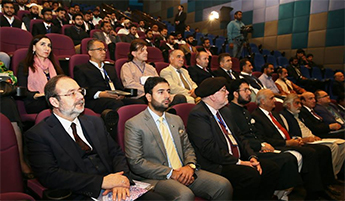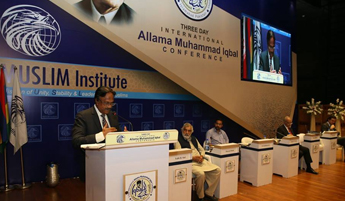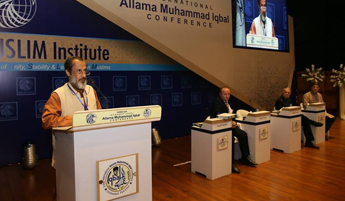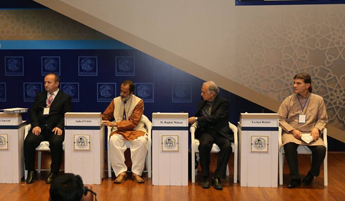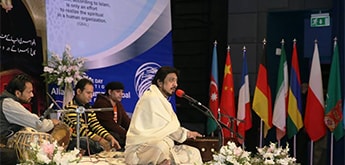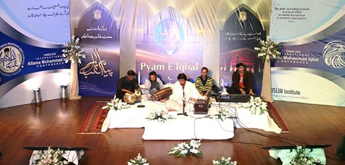|
MUSLIM Institute organized ‘3 Day International Allama Muhammad Iqbal Conference’ at Islamabad on 6-8 November 2017. A large number of people from academia, social sector, media and from different walks of life participated in the Conference. Also many dignitaries, diplomats and members of national assembly participated in the Conference. Mr. Basit Zia (Research Associate MUSLIM Institute) moderated the proceedings of the conference. On second day, three academic sessions were held. In addition, a Musical Evening ‘Pyam-e-Iqbal’, side event of the Conference, was also organized. Classical Singer Ustad Hamid Ali Khan presented the Kalam-e-Iqbal.
Brief Summary of the sessions and remarks shared by speakers on second day are observed as under:
|
| |
Session 03
Iqbal’s Social and Political Thoughts
|
| |
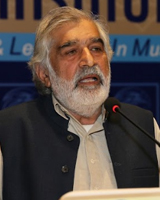 |
Dr. Talib Hussain Sial
Former Director, Iqbal International Institute for Research and Dialogue, Islamabad
|
Emancipation from Psychological Slavery Through Iqbal's Teachings
In the environment of psychological slavery, only followers are created not the leaders. The indication of human psychology is that the individuals and nations follow laws and rules of their masters blindly. They have no initiative and don't have courage to make their own decisions thus their natural capabilities are suppressed and he says, you ought not to rely on vision of slaves, only the free have the insight. Psychological slavery is incompatible with free personality and Dr. Muhammad Iqbal was a thinker of free personality. He believes in human dignity and freedom. But this freedom is not unrestrained freedom. His concept of ego or 'Khudi' is actually the concept of human rights. He says in his lecture 'life offers the scope for ego-activity activity… the principle of ego sustaining deed is respect for the ego in myself as well as in others others’.
|
|
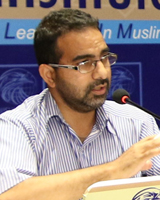 |
Dr. Muhammad Maroof Shah
Author and Columnist, Srinagar, Indian Held Kashmir
|
Rejection of Colonial Approaches and Conduct in Iqbal's Poetry
Colonialism is understood as colonization of traditional space and aggressive outreach or imposition of instrumental rationality or technical reason and thus an extension of desacralizing and dehumanizing project and an illustration of what Heidegger called Europeanization of earth is here to stay that invites appropriation and response rather than outright dismissal and reaction. Iqbal was the first major modern philosopher-poet of the Muslim world to take a very serious note of this and as such evolved a battery of concepts and readings of traditional cultures and modernity that transcend simplistic colonizer/West vs. colonized/Islam binary. Iqbal’s reinterpretations of received understanding of self, religion, classical spirit, Sufism and finality of prophecy and his guarded celebration of reason, science and technology and his plea for alternative political choices for the Muslim world, all have something to do with his response to colonialist discourse.
|
|
|
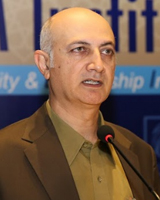 |
Prof. Dr. Ejaz Akram
National Defence University, Islamabad
|
Iqbal as Great Political Thinker of Twentieth Century and Review of Modern Political Thoughts & Challenges
While ridiculing various traditions we have undermined the ability of our traditional mentors. Civic sense which has been part and parcel of our daily life has been lost. In the West (according to modernism), sovereignty belongs to people but in east it is not so. Modernity led to the decline of the west which is evident from thier shrinking demography. If Muslims want to be prosperous then they will have to resuscitate their own traditions instead of copying any other country. The process of modernism has now outlived modernism itself as traditional thinking has actually come about. The master of modernism is now being guided by traditions which Iqbal talked about. If Iqbal might have alive today, he would has suggested that the ‘path followed’ modernism is no longer a solution for us and we should resuscitate our own traditions and use the process of modernization to strengthen our own traditions.
|
|
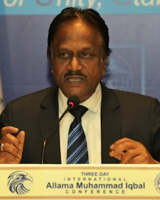 |
Dr. Mahmad Kodabaccus
Secretary General, Parti Mauricien Social Démocrate (PMSD), Mauritius
|
Cheif Guest Speech
Iqbal gave much importance to education and particularly to the youth because he knows that without education and intellect, the future will be murky and gloomy. He said that an individual exist by the virtue of his social contact he is like a wave in a river and have no existence outside. It was Iqbal who called upon Jinnah to lead Muslims of the Subcontinent because Iqbal was of the view that it is only Jinnah who is honest and can carry forward the mission of their freedom. Iqbal was very clear of the fact that Muslims of India can’t develop their culture under the subjugation. Therefore, he gave the Idea of a separate homeland. Although Iqbal faced opposition on his idea of a separate homeland but remained determined to it. Today if we are sitting in Islamabad in Pakistan then we will have to say thank you Allama Iqbal.
|
|
|
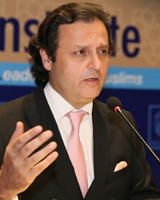 |
Waleed Iqbal
Grandson of Allama Muhammad Iqbal
|
Nature and Values of Iqbal’s Ideal Society
Through the medium of his poetic and philosophical works, Iqbal consistently comes across as a firm believer in the elevation of the human being – the transformation and well-being of man – at the individual and collective levels, through self, selfhood, and self-identity as embodied in his concept of khudi. First and foremost, Iqbal opines that the essence of Tauhid (Islamic monotheism), as a working idea, is human unity, human equality, and human freedom. Secondly, in Iqbal’s view, a society’s rise and fall would largely depend on the conduct of the individuals who lead it and act as its agents. Thirdly, Iqbal further believes that a system of proper and well-grounded education could truly bring about a renaissance of thought and action in the Muslim world. Fourthly, Iqbal is of the firm view that an ideal society must also be a peaceful one.
|
|
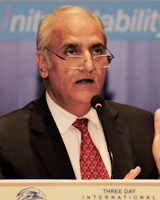 |
Dr. Zaffar Mueen Nasar
Vice Chancellor, University of the Punjab, Lahore
|
Remarks by the Chair
I would like to congratulate the organizers of this conference. Today we need to analyse the idea of society presented by Allama Iqbal and where we stand. Energy stems from what nations try to be at par with other nations. Muslim nations should benefit by developing their own ideas, culture and natural resources. There is a very good example of China; they did not borrow from the West and rather they developed their own model. They are picking up the ideas. But ‘where are they picking them up from? They have their own system and they are modernizing these ideas. Their leaders are giving them the thought that 'Yes, our system is the best'. Similarly, look at Japan; they did not borrow the development model from any other country rather they developed their own. Same should be our approach today.
|
|
|
| |
Interactive Session:
|
| |
 |
|
After the speakers shared their Research papers, interactive session was held. Participants especially the young students participated with keen interest.
In an answer to the question about democratic structure in the mind of Iqbal, Mr. Waleed Iqbal shed the light on lecture number six in which Allama Iqbal quoted the spiritual democracy where the principle of ijtehad can apply and caliphate can be construed as an assembly of elected members. Iqbal himself was a member of Punjab legislative council from 1926 to 1930. Now we have significantly departed from the ideals of the Quaid and Iqbal but both of them believed in modern system of elections for the proper representation of the people. Pakistan itself was a result of democratic struggle. In an answer to a question Dr. Ejaz Akram said that a scholar who is going to teach the students truth from an objective point of view and also from inter-subjective point of view is better.
|
|
|
| |
Session 04
Iqbal - Art and Thought
|
| |
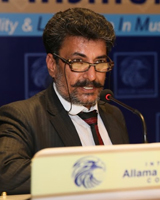 |
Mr. Idrees Azad
International Islamic University, Islamabad
|
Iqbal's Perspective on the Science-Religion Splice
Iqbal mentioned very clearly, “The birth of Islam is the birth of inductive intellect”. Because the birth of inductive reasoning is the birth of science also, so we could develop a deductive syllogism like this,
Premise 1: The birth of Islam is the birth of inductive reasoning
Premise 2: The birth of inductive reasoning is the birth of Science
Conclusion: Therefore, the birth of Islam is the birth of Science.
Iqbal deduced it, not scholastically but almost within Kantian Epistemology. Kantian Synthetic a Priori judgment which of course is the most acceptable epistemology ever found in the history of human knowledge, is a point where analytic and synthetic judgements meet. Thus Iqbal kept the legacy of Ghazali in a sense that he did not allow “Pure Reason” to explore metaphysics rather he found Quran supporting the empirical evidence in order to examine metaphysical claims of religion.
|
|
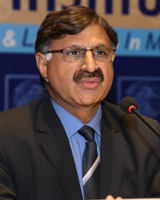 |
Dr. Saleem Mazhar
Dean, Faculty of Oriental Learning, University of Punjab, Lahore
|
Iqbal's Wisdom — Dimensions of His Persian and Urdu Poetry
Allama Iqbal commences his first Persian Masnavi, published in 1915, with the poetic verses of Hadhrat Mevlana Rumi in which Mevlana mentioned quest for a ‘Perfect Man’ who is union of physical and spiritual blessings. When Hadhrat Allama Iqbal discusses ‘Perfect Man’ in his poetry, he idealizes the holy personality of Hadrat Muhammad (PBUH) in his heart, mind and soul. It is not an exaggeration that Allama worte the best Na’at in Persian language which is more effective and concise than the Na’ats of Ghalib and Jaami. Iqbal idealized the most virtuous Mystics and conveyed their teachings to the populace. During last days of his life, Iqbal lamented that people would console after my demise but nobody would try to understand, who was I? From where did I come? And what was my message?
|
|
|
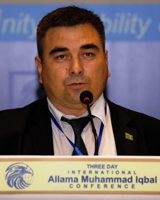 |
Dr. Geldimyrat Muhammad
HOD, History, Institute of Manuscripts, Academy of Sciences, Turkmenistan
|
The Didactic Value of Poems by the Great Poet of the East Allama Muhammad Iqbal
Allama Muhammad Iqbal was an outstanding scholar who thoroughly studied the rich scientific, spiritual, literary and cultural heritage of the East and gained a wide experience in educational institutions of the West. The poet could perfectly reflect his valuable ideas and teachings through his poetry. His mentors played an important part in his high achievements in poetry. He was honoured as poet while he was not thirty yet. His poems were devoted to patriotism, morals, didactics, Sufism, philosophy and were published at different places. The poet adhered to great masters of the East and the West in his works. Poems by Allama Muhammad Iqbal which are interlaced with deep philosophy have a great significance for the education of the younger generation and all peoples in the spirit of mutual respect and high humane qualities.
|
|
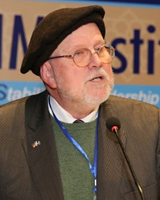 |
Prof. Dr. Hug Van Skyhawk
Department of Science of Religion, Basel University, Switzerland
|
Remarks by the Chair
Iqbal draw his discourse from the father of the languages that is Arabic. He also expressed himself in Punjabi and Urdu, in that way he became very creative and same is true for Persian. Annie Marie Schimel said, “I have learned that the methods of science and the methods of poetry are one thing those of journalism and politics or another but both sides agree the central importance of the ‘word’, the free word in our society, the free word in over lives”, and I think its Iqbal who underscored these remarks and signed it with the ink of his heart. Poetry in the mother tongue of the human race and connects the people of the world as the component of all cultures.
|
|
|
| |
Interactive Session:
|
| |
 |
|
In an answer to the question about deductive reasoning, Mr. Idrees Azad said Ghazali realized difference of deduction and induction, the deductive intellect was always there before Ghazali. Ghazali was the first philosopher who ever found out and told the world that Islam is beginning with inductive intellect because Quran emphasise the need of empirical evidence not merely the rational reasoning. So, deduction is a pure rational activity and empirical evidence is something observed with our five sense. In an answer to a question Dr. Saleem Mazhar said that in the circumstances of subcontinent it was inevitable for the Muslims to have their separate home land where they could live independently according to the teachings of Islam.
|
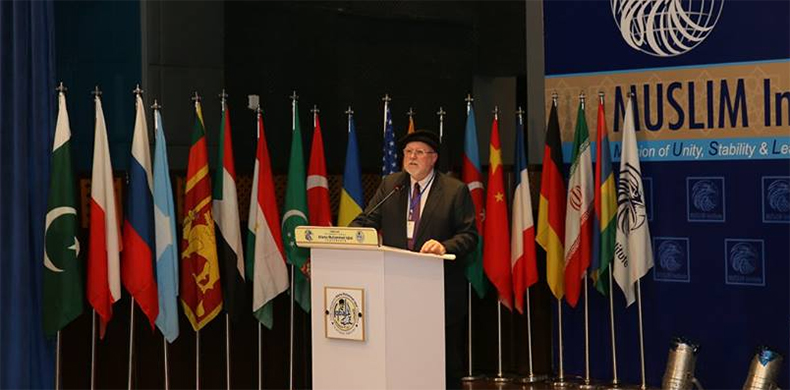 |
| |
Session 05
Comparative Study of Iqbal with other Thinkers/ Philosophers
|
| |
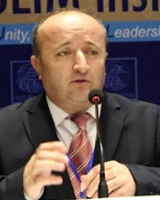 |
Dr. Nurali Nurzad
Faculty of Persian Literature, Khujand State University, Tajikistan
|
A Perfect Human Being as Described by Sultan Bahoo, Abulmaani Bedil and Muhammad Iqbal Lahori
The philosophy of perfect humanity is a form of self-esteem, with a combination of spherical spheres that opens up the human body to the Creator and the universe, in the minds of the speakers, the scientist, and the various scholars, who have been interpreting identical and implicit signs. Hadhrat Sultan Bahoo, Abulmaani Bedil and Muhammad Iqbal along with the geographical and linguistic unity between them, made a great deal of achievement in the discovery of a perfect human being. Sultan Bahoo describes the perfect man in the form of Sheikh in his books ‘Kaleed ul Toheed’, ‘Makhaq-ul-faqr’, and 'Ain-ul-faq’r'. The perfect man is also the criterion and the most important of all the wonders of the universe. Muhammad Iqbal also made this great way in the universe of perfect human mind, and explained the perfect humanity, which relates to the theory of past and present.
|
|
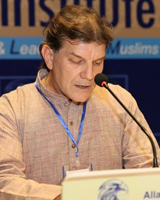 |
Mr. Yevhen Reutov
Senior Lecturer, Kiev National Linguistic University, Ukraine
|
Muhammad Iqbal & Muhammad Asad Cultural Discussion in the Changing World
Muhammad Asad was a Jewish-born Austro-Hungarian journalist, traveler, writer, political theorist, diplomat and Islamic scholar. Asad was one of the most influential European Muslims of the 20th century. After traveling across the Arab World as a journalist, he converted to Islam in 1926. On his visit to Indo-Pak Subcontinent he met Muhammad Iqbal, who persuaded Asad to stay in the Subcontinent and work to elucidate the intellectual premises of the future Islamic state. From this point forward, Asad would be a Muslim intellectual and thinker while lecturing and writing on Islamic culture and law. At the request of Muhammad Ali Jinnah, Asad compiled a document on suggestions for an Islamic Constitution for an Islamic State. Later, he became Pakistan’s envoy to the United Nations.
|
|
|
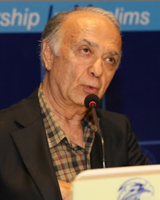 |
Dr. Mohammad Baghai Makan
Former Professor, Iran Cultural Heritage, Iran
|
Analysis of Ideological Harmony in Rumi's Message and Iqbal's Philosophy
Iqbal was an innovative philosopher who discussed new and important issues of his era. Another important issue mentioned by Iqbal is sectarianism. It is a disease which is killing the Muslim nation. However, Iqbal and Mevlana were pluralist. When critics of Iran compare the work of Iqbal and Mevlana, they designated Iqbal the Mevlana of 20th century. The most important thing of Iqbal and Mevlana is their idea about humanity. According to Iqbal, God is searching for the Ideal man like it is in a Hadith that God has some men that His will is upon the will of His ideal men. Iqbal also urged the Muslims to use their intellect and be self-sufficient. Sadly, the Muslims don’t act upon it and they are dependent upon others for everything. Iqbal and Mevlana also stressed upon innovation.
|
|
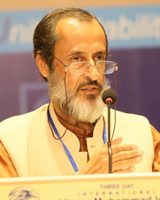 |
Dr. Suheyl Umar
Former Director, Iqbal Academy Pakistan
|
Remarks by the Chair
Iqbal was a great admirer of Punjabi mystical poetry. There are also comparative studies on Iqbal and the Punjabi poets like Mian Mohammad Bakhsh and Khwaja Ghulam Farid. However, domain of comparative studies on Iqbal and Punjabi poetry is under research. According to Hadrat Sultan Bahoo, a raw undisciplined human soul emerges as adorned by divine qualities through Tazkia, Akhlaq and through the relationship of Mentor (Murshid) and follower (Mureed). During this process, all the blame worthy character traits are obliterated and praise worthy character traits, which in the ultimate analysis are an imprint of the divine qualities on the human soul, take permanent root in the human soul. Thus it gives the perfect human model. Same trajectory is traced in the teachings of Bedil which is consisted in discipline, ‘Tarbiah’ and ‘Tazkiah’. Iqbal also described these stages of training and discipline.
|
|
|
|
|
| |
Session 06
Musical Evening ‘Pyam-e-Iqbal’
|
| |
|
A Musical Evening ‘Pyam-e-Iqbal’ was also organised on the evening of 2nd day which was a side event of the Conference. Classical Singer Ustad Hamid Ali Khan presented the Kalam-e-Iqbal. Following were the speakers who shared their views.
|
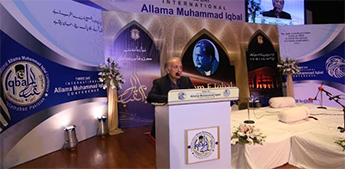 |
|
Dr. Mohammad Baghai Makan
Former Professor, Iran Cultural Heritage,
Iran
|
|
|
There is a need to organize these kinds of events about many other scholars, writers, philosophers and thinkers. Iqbal is like a brilliant and shinning moon in the sky where other philosophers and thinkers are as stars.
|
|
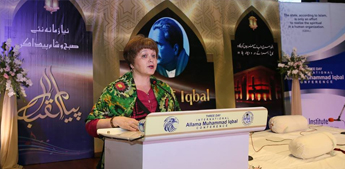 |
|
Dr. Irina N. Serenko
Senior Research Scholar, Institute of Oriental Studies of the Russian Academy of Sciences, Russia
|
|
|
The great philosopher poet, Dr. Allama Iqbal, has provided us an opportunity to understand each other’s culture in order to have peaceful coexistence and overcome the challenges to achieve global peace.
|
|
|
|
|
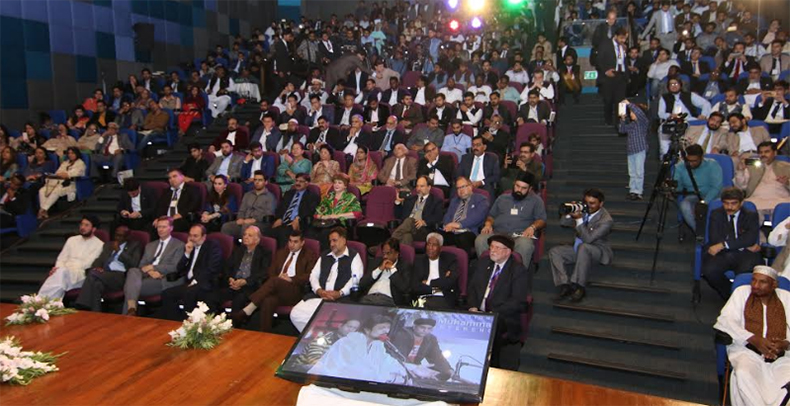 |
| |











